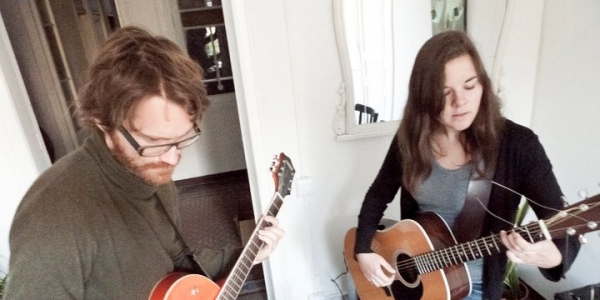“I like reading newspapers to try and dig out these little gems,” Fullbrook says of discovering stories such as that of Adelir de Carli, which inspired Priest With Balloons. “I used to cut them out of the newspapers and stick them on our fridge. One day they just struck me, especially the priest with the balloons story.”
Adelir de Carli was a Brazilian Catholic priest, human rights activist and experienced skydiver who went missing after lifting off in a chair strapped to 1000 helium balloons (parts of his body were later found). Not only was it an attempt to break a 19-hour record for the most hours flying with balloons, but an effort to raise funds for a spiritual rest stop for truck drivers in the Brazilian city of Paranaguá. “It’s completely tragic, but slightly hilarious at the same time,” Fullbrook says with a hesitant giggle, “…like what kind of a person was he? I like looking for the comedy in tragic moments because I think that the two often go hand-in-hand. It’s a sad and dark story, not something to laugh at, but people do laugh about it, and I think that’s because it’s quite moving. I think often you find things amusing when you’re moved by something.”
The warmth and richness of Fullbrook’s voice is a captivating and otherworldly force, but she notes that her voice has changed significantly over the years. “As a teenager, I started writing songs, but didn’t like the sound of my voice at all,” Fullbrook admits. “It was very high-pitched for one thing. I think going into my early 20s, it matured and I found a vocal style that I felt very comfortable with and it was also to do with the expression of the lyrics and that shaped the sound of my voice more. I started writing songs that were maybe a bit lower in the vocal range and I could do things with it that I wasn’t able to do when I was younger, so it was quite a recent thing. I’m 25 now, almost 26, and it does keep changing. The voice is really interesting in that it keeps surprising you,” she laughs.
Fullbrook began learning the cello at the age of seven, but moved from her birthplace of Bristol in England to WestAuckland three years later. Her grandfather encouraged Fullbrook to pick up her mother’s old acoustic guitar at the age of 11, and she began writing songs from 14. “I remember it so vividly,” Fullbrook says of the life-changing moment. “I was sitting in the lounge and my mum had always had this guitar lying around and my grandfather was visiting from the UK. He would play some Johnny Cash songs and old country numbers, and I loved listening to him. He has a beautiful, deep voice. I was just sitting there entranced watching him play and he said: ‘How about I teach you a few chords?’ Basically, from that afternoon on, I’ve just loved the guitar. I couldn’t wait to get home from school to just sit in my room and play. The cello kind of took a back seat in terms of my personal preference.”
Fullbrook’s musical entity as Tiny Ruins emerged out of writing music for theatre productions and playing at live music/poetry nights. “The writing for theatre was a real trigger for a new mode of songwriting for me – I wrote Bird in The Thyme for a production of Twelfth Night that the university was putting on,” Fullbrook explains. “From that moment, my songwriting changed and I felt like I was writing a new batch of songs for a new project.
“About two years ago, I was encouraged by my flat mate to play at an open mic night and the sound guy at this particular night at this cafe offered to record some demos for me and I took him up on the offer. As soon as I had something tangible, I started thinking about putting it on MySpace and releasing it just to see what people would think of the songs. At the same time, I thought that I wanted to choose a name that gave me a bit of anonymity and also represented the songs and could maybe become something bigger or become a band.”
Tiny Ruins released the beautiful collaborative EP, Little Notes, with Barcelona-based artist A Singer Of Songs (aka Lieven Scheerlinck) last December following a tour of Northern Spain mid-2010. Some Were Meant For Sea draws listeners into an intimate, tranquil and contemplative space as the recording process evoked a similar sentiment. “It was a careful process, but we didn’t get too bogged down in anything – we moved on when we weren’t feeling it,” says Fullbrook of recording in an isolated school hall in South Gippsland with acclaimed Australian producer/composer, Greg J. Walker.
“I think with recording, you have to go by your instinct and whether something has an effect on you the first time you hear it. Greg was really great with that because he likes to move quite swiftly and not dwell on nitpicking details. It meant that the recording process was actually quite relaxed and enjoyable and we had time to enjoy South Gippsland and its many charms,” she laughs. “Greg went for several surfs and we trawled through the local garage sales. South Gippsland is quite cold and rainy, and a bit of a strange place.” Perfect for Tiny Ruins, then.

